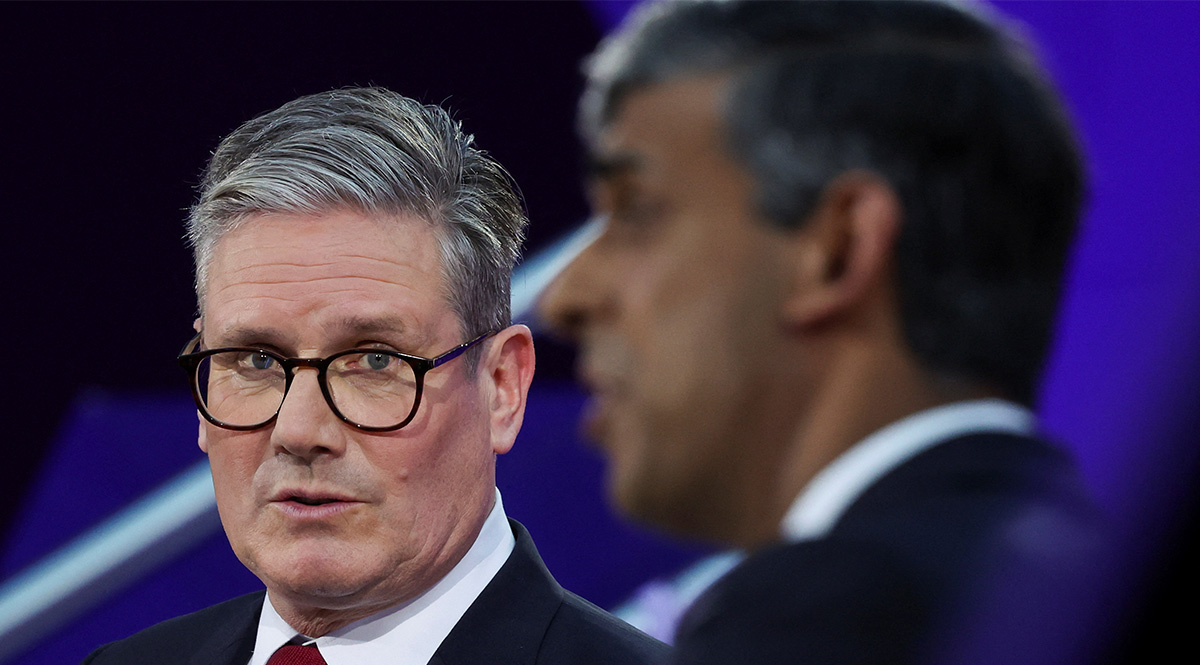Britain's Election Campaign Intensifies
Prime Minister Rishi Sunak’s announcement of the General Election on 28 May marked the start of an intense six-week campaign. Setting it for 4 July was expected to increase the ruling party’s chances of reversing the downward trend in the polls. However, despite a favourable change in the economic trend in recent weeks, the Conservatives have continued to lose support, ranking at least 20 percentage points below Labour in the polls. As a result, a new Labour government led by Sir Keir Starmer is likely to get an unprecedented representation in the House of Commons of 450 MPs out of 650.
 Phil Noble / Reuters / Forum
Phil Noble / Reuters / Forum
Campaign Opening
Under the UK system, the setting of an election date is the prerogative of the prime minister before the end of the term (in this case, January 2025) and usually is expected to use the timing of it to strengthen the ruling party’s electoral chances. However, the Tories have faced the challenge of poor ratings in the last year (15-20% on average against 35-40% for Labour) and voter fatigue with 14 years of Conservative rule and numerous internal conflicts. In this situation, Sunak’s aim was to cash in on the first news of positive economic trends (inflation falling to 2%) and the launch of the Rwanda scheme to deport immigrants who entered Britain illegally to that country, scheduled to begin in July (before the mechanism could be blocked by the British courts). The PM also wanted to make it more difficult for Nigel Farage’s Reform UK to organise their campaign, given the weakness of its local structures. Reform had been rising in the polls for a year at the expense of the Tories. Interestingly, this factor was less important for the other opposition parties with well-established party apparatuses.
Labour’s key challenge was to recruit several hundred new MP candidates, prepare the composition of the new government on the basis of the relatively lean current cadre, and rebuild the necessary expertise in administrative processes. To this end, as early as March 2023, Starmer appointed retired senior civil servant Sue Gray as his chief of staff. Another major challenge was to calm the dispute within the party over the Gaza conflict.
Tory and Labour’s Election Platforms
The manifestos seem moderate, especially compared to the previous 2019 General Election, when the dispute over the which Brexit model to follow was the clear focus of the campaign. The Tory messaging highlights the party’s successes (e.g., the reorganisation of education in England), Labour’s fiscal threat to Conservative voters (e.g., plans to impose VAT on public school tuition fees), and points out inconsistencies in its rivals’ migration policies. Nevertheless, the ruling party has not proposed significant new ideas.
The Labour manifesto as a future governing party, as Starmer observed, does not include new policy proposals. The Labour Party traditionally has pledged to increase welfare spending, but it did not announce any significant tax increases, which would be necessary to fund it. Similarly, it envisages maintaining a restrictive immigration policy, but plans to replace the Rwanda extradition agreement with an EU readmission agreement. In reference to Brexit, Labour declared a willingness to conclude a number of agreements to complement the EU-UK Trade and Cooperation Agreement (TCA, e.g., on sanitary and phytosanitary standards), but, given the attitude of its pro-Brexit voters, the party has been ruling out the UK re-joining the customs union or the EU single market. In the face of Labour’s exceptionally positive poll ratings, the party’s election manifesto seems to have been written to grant the future prime minister as much freedom to manoeuvre as possible.
In contrast, the positions of the Liberal Democrats as a traditional third party (projected to receive 9-12% votes and a few dozen seats), the Greens (6%, 2-3 seats), and the Scottish National Party (1.5%, around 30 seats) are similar to previous campaigns. However, due to their centre-left nature, these parties do not affect the main axis of Labour’s competition with the Tories.
Revolt on the Right
The most important difference in the current campaign compared to the traditional competition framework is the strong position of the Reform UK, formerly known as the Brexit Party. Founded by Nigel Farage in 2018 to implement a radical Brexit model, the party was instrumental in the collapse of Theresa May’s government. In the previous General Election campaign, the party fought for the votes of pro-Brexit Labour voters, and withdrew its candidates from contesting the Tories under Boris Johnson. Reform UK is socially conservative and opposes the social and economic costs of a rapid green transition and record-high immigration (700,000 in both 2022 and 2023). It supports the UK’s withdrawal from the European Convention on Human Rights. Its economic platform has strong traits of Thatcherite liberalism (including deregulation at the expense of laws inherited from the EU, tax cuts, privatisation). Its electoral base is English and Welsh provinces. In the current campaign, Farage’s party is fighting both Labour and the Tories, winning voters at the expense of mainly the latter. Over the course of the campaign, the average poll ratings for Reform UK have risen to levels comparable to the Tories (15-18%).
Prospects
The latest polls point to the possibility of Labour gaining the strongest government majority in the House of Commons in the history of modern British democracy (i.e.,since the 1884 reform). Such a result could be achieved even if the winner’s ratings are not very high (in light of the polls, Labour could win fewer votes than Johnson’s party in 2019 or their own under Jeremy Corbyn in 2017). The scale of the expected success of Starmer’s party appears to be due to the unprecedented weakness of the Conservatives. Accordingly, the Labour leader’s approval ratings remain relatively low (voter confidence of -20% to +10% against Sunak’s catastrophic ratings of -30% to - 55%).
The primary reason for the likely scale of the Tory defeat is the takeover of around 25-30% of their 2019 voters by Reform UK. The Conservatives’ ratings are also being dragged down by a public backlash over many scandals, including the most recent one involving Sunak’s close associates’ illicit use of confidential information to place gambling bets on the election date. The British electoral system based on single-member constituencies and a plurality rule will make it difficult for Farage’s party to win more than a few seats (against at least a few dozen for the Tories). Nevertheless, the competition on the British right will determine the post-election profile of the Conservative Party (unification with Reform UK versus defending Sunak’s centrist position) and influence the opposition’s attitude towards the future government. The Reform Party is likely to deny the Tories the opportunity to form a regular “shadow cabinet” (for which at least around 100 MPs are needed).
The Labour Party is signalling a desire for rapprochement with the EU, which may be helped by both its convergence with the EU mainstream parties (the Christian Democrats, Socialists and Liberals) ideological profile and its ability to pass in parliament any agreements concluded with the EU (which was a challenge in the House of Commons in 2017-2019). Also important from Poland’s point of view is Labour’s upholding in the election debate of the current Tory policy towards Ukraine and Russia, including a commitment to increase the UK’s defence budget to 2.5% of GDP. Starmer’s party also announced a willingness to conclude a security and foreign policy cooperation agreement with the EU, omitted by the Johnson government in the TCA negotiations. This contrasts with Farage’s statements attributing co-responsibility to the West for provoking Russian aggression and rejecting closer cooperation within the EU.
However, it should be kept in mind that in the current campaign, Labour is not seeking a mandate to change the post-Brexit agreements with the EU. On the contrary, the issue has been muted in the campaign and Labour’s manifesto announced that the UK will remain outside the EU’s customs union and common market. This includes not agreeing to restore free movement of people. Among others, Labour has publicly rejected the EU’s initial proposal for a free movement agreement for young people (18-35 year olds). Expanding security cooperation may also be conditioned by an agreement on the readmission of immigrants who entered Britain illegally to the EU and the admission of British companies to EU arms programmes (such as EDIS or PESCO), which would provoke conflicts with Member States with opposing interests (especially France). Finally, a source of tension in UK-EU relations may be the strong expectation within the Labour Party that the EU will be more open to their demands, in contrast to the EU’s rigid stance in negotiations with the pro-Brexit Tories.





.jpg)